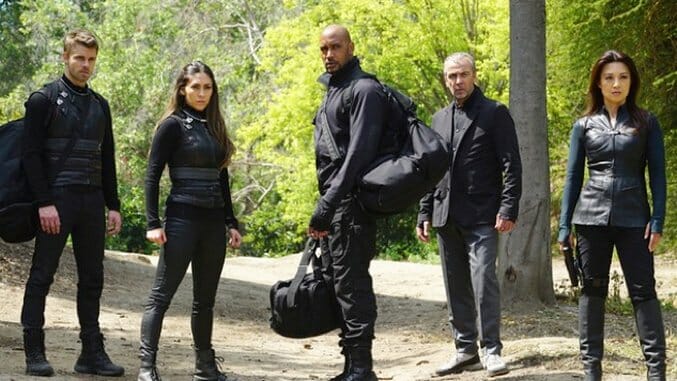Agents of S.H.I.E.L.D.‘s Finale Proves the Third Season Was its Best So Far
(Episode 3.21, “Absolution” and Episode 3.22, “Ascension” )

Season finales can tell you a lot about a show. Pilots are like rough drafts: imperfect, but with a lot of genuine affection. Season premieres are introductions, first chapters. They lay out themes, information, images that will matter later. But season finales tell you what the production team really cares about. Finally we find out why characters suffered through all the losses, celebrated all the wins, and filed all the paperwork they had to this season. All those images and facts and themes suddenly become a lot clearer, and we see what the production team has really been trying to get at all season.
It’s probably not all that much of a surprise to find that this season is exploring the nature of forgiveness and sacrifice, absolution and ascension. Not surprising, but just in case you need a reminder, we start tonight’s finale right back where it all began on Maveth. Except this time we aren’t with Jemma. It’s Daisy and Coulson trapped in a containment pod, and apparently they’re the only members of our S.H.I.E.L.D. team left. Devastating, confusing, and oh yeah, completely a dream. It seems Daisy’s guilt over her Hive-controlled behavior is resulting in some pretty awful nightmares.
It’s interesting that this year’s season finale is mimicking last year’s scheduling pattern by airing two episodes back to back, especially when you compare that unlike last year’s “S.O.S. Part 1” and “S.O.S. Part 2,” “Absolution” and “Ascension” are not actually on longer than average episode. Each episode has it’s own focus and tells an extremely contained narrative. “Absolution” in particular focused much more on character psychology. Daisy’s nightmares, withdrawal symptoms, and overall feelings of worthlessness come center stage as the team struggles to set plans against Hive in motion.
After bringing Hive’s plan to launch the primitive creating warhead to a halt, S.H.I.E.L.D.’s plan to defeat the most amiable of eldritch horrors seems to lose a bit of cohesion. What are they doing there? Why can’t Lincoln be a bit more sensitive when talking about Andrew? Will Mack and Yo-Yo have time to admit their feelings for each other while building, well, whatever it is they’re building?
It will all be revealed in time, but the stalling gives us a chance to really see how our characters have changed this season. May’s tolerance for her less tactful teammates’ comments has certainly grown. Mack and Yo-Yo, who were both introduced as extreme stoics playing everything close to the vest, are opening themselves up to new people. Lincoln shows us that when it is absolutely necessary, he can control his impulsiveness for at least a little while. In fairness, Hive taunting anyone about a significant other would be difficult.
Even the defeat of Hive himself leans much more towards the realm of psychological warfare than a typical action sequence. When we finally see Yo-Yo and Mack’s device in action we learn that it’s derived from S.H.I.E.L.D.’s painfully effective memory recovery machine. There’s a lot to appreciate in this approach to defeating a villain. Not only is it more original than a standard hand to hand battle, but it has the added benefit of playing with the complicated motivation and control that Hive must sometimes suffer with, after having so many other’s memories trapped in his own head.
Daisy will later remark that stealing people’s memories is practically the same thing as stealing their souls. Her point is valid, but I think Agents is actually more interested in exploring how memories, and in particular owning your own memories, affects the process of coping with psychological trauma. Daisy’s lack of clarity with regards to her own motivations, her inability to remember if her motivations for behaviors like attacking Mack were justified—because under Hive everything is justified—are just further examples of Hive’s victimizing. Yes, the drug withdrawal is awful, but what wears on Daisy more is the lack of trust she has in herself. She can’t forgive herself because, from her perspective, there is no differentiating quality that makes Hive-controlled Daisy different from Daisy as she is now.
It all culminates in a beautifully acted moment from Chloe Bennet, where you see her both submit to Hive and challenge our expectations of what a survivor looks like. Daisy is no wilting flower. She is opinionated and demanding as ever. But seeing how broken she is, and her willingness to give up her restored freedom just to feel connected to people she doesn’t even like is heartbreaking. We’re seeing Skye as a shell of her former self, and while we may not like it, can anyone really blame her for wanting to feel something, anything, but angry and empty again?
![]()
If the first episode of tonight’s season finale focused on the psychological journeys of our favorite S.H.I.E.L.D. agents, then “Ascension” is the action-packed comic book adventure we all expect. Don’t believe me? It features: Non-Hawkeye S.H.I.E.L.D. personnel crawling through the air vents, homemade wound cauterization, heat seeking primitives, invisible weapons, and the Daisy versus (kind of) Ward smack down we’ve all been waiting for since Season One. All of this before not just one, but two major character deaths, and a pretty major teaser for next season.
It’s funny to think that all this and so much more may never have happened if only the S.H.I.E.L.D. maintenance team had reprioritized their post-Daisy breakout repair list. I truly feel like the real lesson we should take from this story arc is always fix the hanger bay doors. Because, honestly, it’s not a real lock down if your base has a giant open skylight.
-

-

-

-

-

-

-

-

-

-

-

-

-

-

-

-

-

-

-

-

-

-

-

-

-

-

-

-

-

-

-

-

-

-

-

-

-

-

-

-








































